Daily Vocabulary Words: List of Daily Used Words in Leading Indian Newspapers
Hi there. Welcome to this special section @ Wordpandit. Our endeavour here is straightforward: highlighting daily vocabulary words that you would come across in leading newspapers in the country. We have included the following newspapers in our selection:
• The Times of India
• The Economic Times
• Hindustan Times
• Mint
• Indian Express
We are putting in extensive work to develop your vocabulary. All you have to do is be regular with this section and check out this post daily. This is your repository of commonly used words; essentially, we are posting a list of daily used words. Hence, this has significant practical application as it teaches you words that are commonly used in leading publications mentioned above.
Visit the website daily to learn words from leading Indian newspapers.
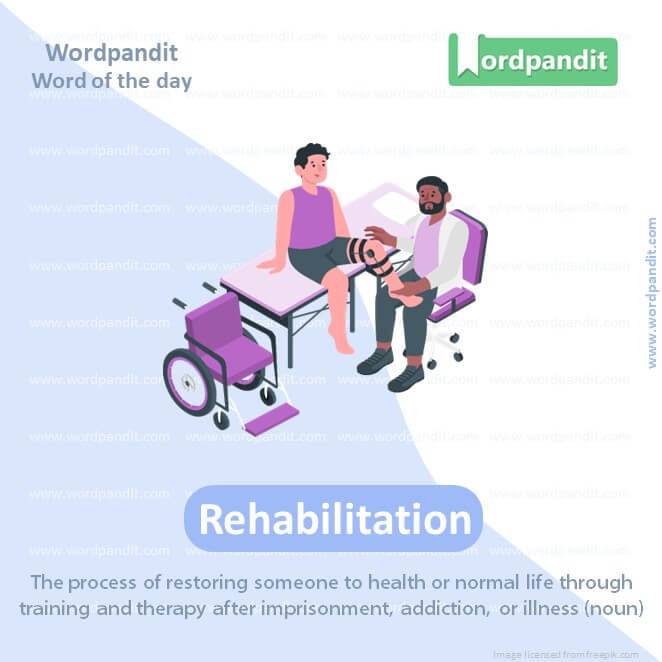
WORD-1: Rehabilitation
CONTEXT: The government will provide a one-time compensation of ₹2 lakh each to Muslim Marriage Registrars for their rehabilitation after the Act is repealed.
SOURCE: Hindustan times
EXPLANATORY PARAGRAPH: Imagine you have a toy that’s broken, and you fix it so it can be played with again. Rehabilitation is kind of like that, but it’s for people or places. It helps them get better after they’ve been sick, hurt, or if a place is damaged, making it good and useful again.
MEANING: The process of restoring someone to health or normal life through training and therapy after imprisonment, addiction, or illness (noun).
PRONUNCIATION: Ree-huh-BIL-i-tay-shun
SYNONYMS: Recovery, Restoration, Healing, Mending, Recuperation, Renewal
USAGE EXAMPLES:
1. The rehabilitation center helps people recover from injuries.
2. Wildlife rehabilitation focuses on the care of injured animals.
3. The rehabilitation of the old building preserved its historical significance.
4. After the surgery, she underwent a long period of physical rehabilitation.
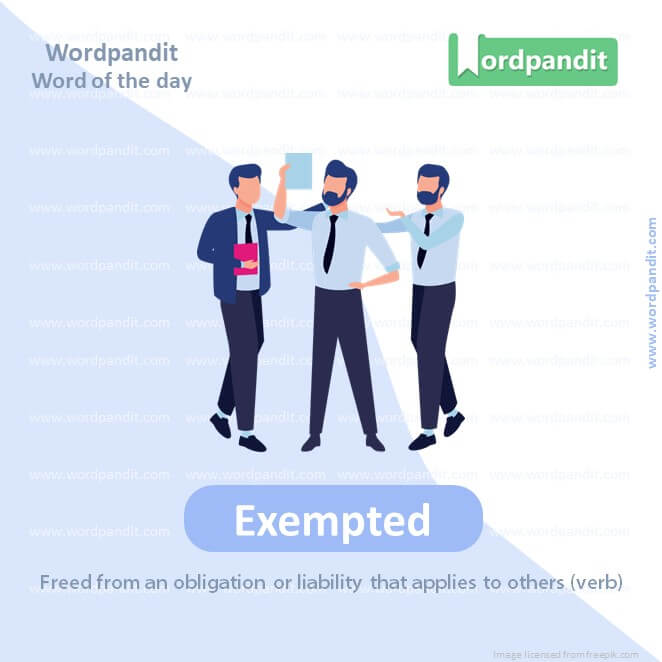
WORD-2: Exempted
CONTEXT: He said the tribal community will be exempted from the ambit of the Uniform Civil Code.
SOURCE: Hindustan times
EXPLANATORY PARAGRAPH: Imagine if there was a rule that everyone had to clean up the playground after playing, but you were told you didn’t have to do it just this one time. Being “exempted” means you’re given a special pass to not follow a rule or do something that everyone else has to do.
MEANING: Freed from an obligation or liability that applies to others (verb).
PRONUNCIATION: Ig-ZEMP-ted
SYNONYMS: Excused, Spared, Released, Relieved, Discharged, Absolved
USAGE EXAMPLES:
1. She was exempted from paying taxes because of her low income.
2. Due to his health condition, he was exempted from military service.
3. Students with disabilities are often exempted from certain physical education activities.
4. Charitable organizations are usually exempted from certain federal taxes.
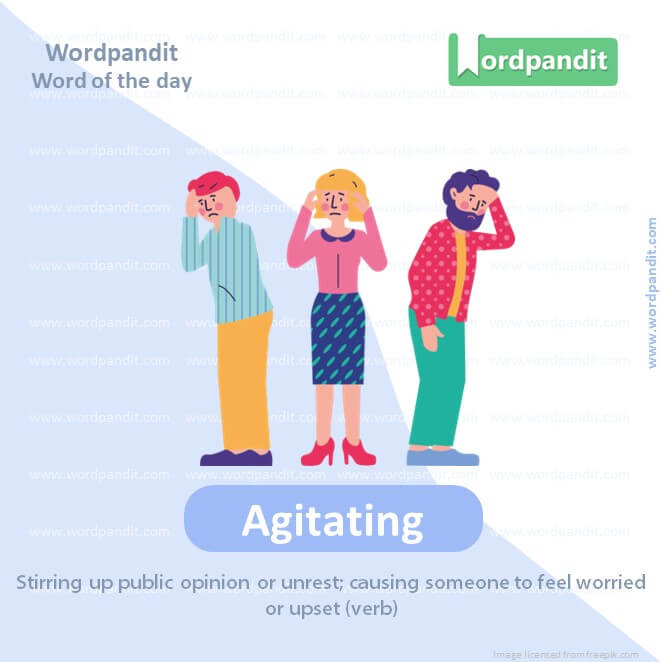
WORD-3: Agitating
CONTEXT: Thousands of farmers remain camped at Khanauri and Shambhu borders with their tractor-trolleys and trucks agitating for their demands.
SOURCE: Hindustan times
EXPLANATORY PARAGRAPH: Think about when you shake a bottle of juice before opening it; you’re mixing everything up so it tastes better. “Agitating” is like that but can also mean when someone is trying to make others think about problems or changes, kind of like stirring up ideas so people talk about them and maybe even fix them.
MEANING: Stirring up public opinion or unrest; causing someone to feel worried or upset (verb).
PRONUNCIATION: AG-i-tay-ting
SYNONYMS: Stirring up, Provoking, Exciting, Disturbing, Ruffling, Inciting
USAGE EXAMPLES:
1. The politician was known for agitating for social reforms.
2. The film was successful in agitating thoughts on the issue.
3. He found the noisy construction work agitating.
4. The activists are agitating for change in the community.
WORD-4: Galvanised
CONTEXT: The death of a farmer in clashes with security forces galvanised the protest, with Samyukt Kisan Morcha (SKM), which had till then stayed away, joining the stir.
SOURCE: Hindustan times
EXPLANATORY PARAGRAPH: Imagine if you could make your toy robot move faster and stronger with just a zap of energy. “Galvanised” means to inspire or excite someone or something to action, kind of like giving them a special energy boost to do something important or make a big change.
MEANING: Stimulated into action; motivated or energized (verb).
PRONUNCIATION: GAL-vuh-nized
SYNONYMS: Motivated, Energized, Stimulated, Spurred, Invigorated, Activated
USAGE EXAMPLES:
1. The team was galvanised by the coach’s speech.
2. The community was galvanised into action by the local issue.
3. The threat of closure galvanised the workers to protest.
4. News of the injustice galvanised people nationwide.
WORD-5: Intuitive
CONTEXT: NASA and Intuitive Machines have been getting data from the lander and think that most scientific instruments are still functional.
SOURCE: Hindustan times
EXPLANATORY PARAGRAPH: Think about when you know how to play a game without anyone teaching you, like you just understand it by feeling. “Intuitive” means something is easy to understand or use without needing to think hard about it, or when someone can feel or know things without having to figure them out step by step.
MEANING: Understood or known without conscious reasoning; easy to use or understand without needing to think hard (adjective).
PRONUNCIATION: In-TOO-i-tiv
SYNONYMS: Instinctive, Natural, Spontaneous, Automatic, Inherent, Unconscious
USAGE EXAMPLES:
1. She had an intuitive sense of what the children needed.
2. The software is designed to be intuitive and user-friendly.
3. His intuitive approach to problem-solving often leads to innovative solutions.
4. Artists often rely on their intuitive understanding of color and form.
WORD-6: Stirred
CONTEXT: the AI’s refusal to take a stand against pedophilia has stirred up heated debates and conversations.
SOURCE: Hindustan times
EXPLANATORY PARAGRAPH: Imagine mixing a big bowl of your favorite soup to make sure all the yummy ingredients are mixed well. That’s what “stirred” means. It’s moving something around gently or to cause someone to feel a strong emotion or desire to do something.
MEANING: Moved or mixed gently; to cause an emotional or mental reaction in someone (verb).
PRONUNCIATION: STURD
SYNONYMS: Mixed, Agitated, Moved, Shaken, Roused, Awakened
USAGE EXAMPLES:
1. She stirred the soup to prevent it from sticking to the pot.
2. The movie stirred emotions in everyone who watched it.
3. The speech stirred the crowd to take action.
4. The wind stirred the leaves on the ground.
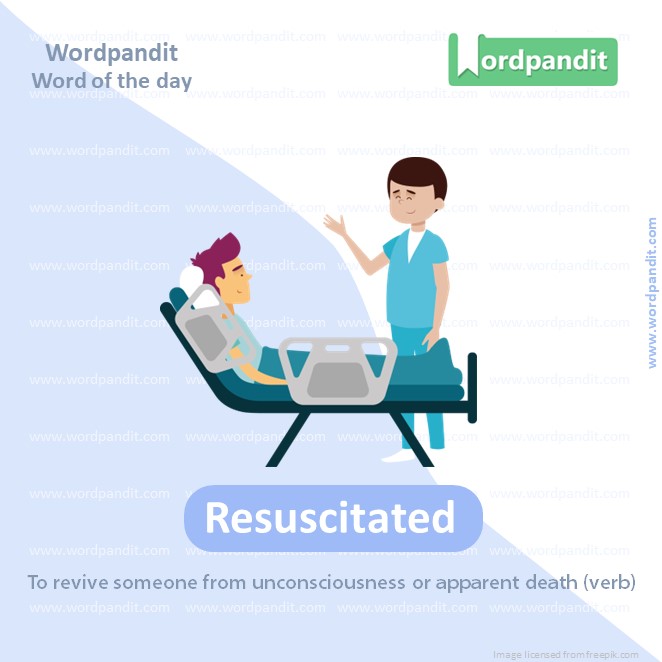
WORD-7: Resuscitated
CONTEXT: The police and paramedics tried to resuscitate her, but it was too late. She was pronounced dead at the scene.
SOURCE: Hindustan times
EXPLANATORY PARAGRAPH: Imagine if your favorite toy stopped working, and then you changed the batteries and it started working again. “Resuscitate” is a bit like that but for living things. It means to make someone come back to life or become conscious again after they’ve been very sick or injured.
MEANING: To revive someone from unconsciousness or apparent death (verb).
PRONUNCIATION: Re-SUS-ci-tate
SYNONYMS: Revive, Reanimate, Restore, Revitalize, Rejuvenate, Awaken
USAGE EXAMPLES:
1. The doctors managed to resuscitate the patient after he stopped breathing.
2. Emergency procedures were used to resuscitate the drowning victim.
3. Efforts to resuscitate the failing company were successful.
4. The revival meeting aimed to resuscitate the community’s faith.
WORD-8: Stabbed
CONTEXT: A 17-year-old migrant boy from Nicaragua was stabbed in the back by a group of masked assailants in Times Square on Thursday evening, sparking a massive manhunt for 16 suspects, according to NYPD.
SOURCE: Hindustan times
EXPLANATORY PARAGRAPH: Imagine if someone used a sharp pencil to poke a hole in a piece of paper. “Stabbed” is a word we use when someone gets hurt by something sharp being pushed into them. It’s not a nice thing, and it can make someone feel really bad or get very injured.
MEANING: Pierced or wounded with a sharp object (verb).
PRONUNCIATION: STABD
SYNONYMS: Pierced, Gored, Speared, Lanced, Impaled, Pricked
USAGE EXAMPLES:
1. He was stabbed during the altercation.
2. The character in the novel is stabbed with a knife.
3. She accidentally stabbed her finger while carving the pumpkin.
4. The detective found the weapon that was used to stab the victim.
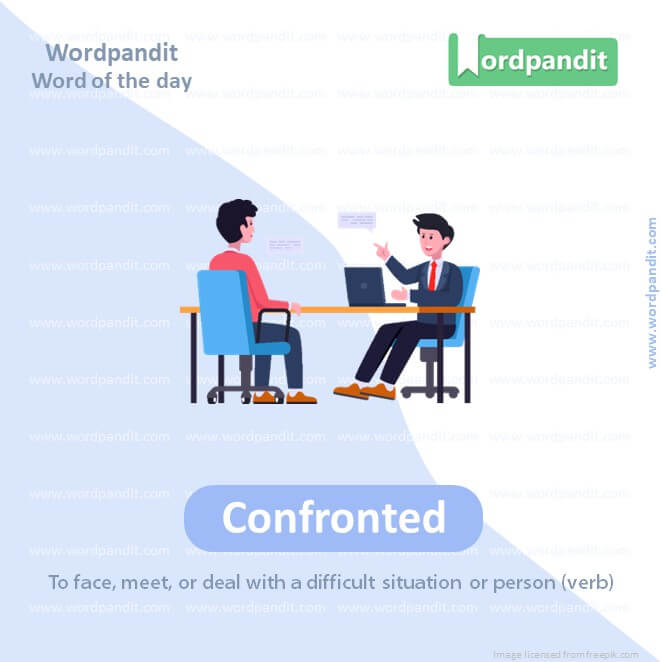
WORD-9: Confronted
CONTEXT: The teen was with his friends on his first visit to the iconic tourist destination when the attackers confronted them on West 42nd Street near Eighth Avenue around 5:30 p.m., shouting
SOURCE: Hindustan times
EXPLANATORY PARAGRAPH: Think about a time when you had to stand in front of someone and tell them something important, even if it was a bit scary or uncomfortable. “Confronted” means just that—facing someone or something directly, especially a problem or a difficult situation, and dealing with it head-on.
MEANING: To face. meet, or deal with a difficult situation or person (verb).
PRONUNCIATION: Kuhn-FRUN-ted
SYNONYMS: Faced, Encountered, Challenged, Opposed, Tackled, Addressed
USAGE EXAMPLES:
1. She confronted her fear of heights by going skydiving.
2. The team confronted the issue directly in the meeting.
3. He was confronted by the angry customer.
4. The government was confronted with a major crisis.
WORD-10: Profusely
CONTEXT: The gang then chased the boy, and one of them stabbed him in the lower back, leaving him bleeding profusely on the ground, police said.
SOURCE: Hindustan times
EXPLANATORY PARAGRAPH: Imagine if you turned on a water tap all the way and water was gushing out really fast and a lot. “Profusely” is a word we use when something is happening a lot or very intensely, like when someone is saying sorry many times because they really mean it or when it’s raining super hard outside.
MEANING: In a large amount or to a great degree; abundantly (adverb).
PRONUNCIATION: Pro-FUSE-ly
SYNONYMS: Abundantly, Excessively, Lavishly, Copiously, Extensively, Plentifully
USAGE EXAMPLES:
1. He apologized profusely for the mistake.
2. The tree was blooming profusely in the spring.
3. She thanked them profusely for their help.
4. The wound was bleeding profusely.
Vocabulary
Language is a confluence of thoughts, emotions, and experiences that find vibrant expression through words. In this spectrum, ‘vocabulary’ shines as a critical aspect that shapes and directs our language proficiency. It offers depth, nuance, and clarity to our expressions. However, mastering ‘vocabulary’ is an art that requires a strategized approach.
An intensive strategy for learning ‘vocabulary’ goes beyond the limiting precincts of memorization. Instead, it nudges learners towards comprehension and application. To understand ‘vocabulary’, take a step forward from traditional textbooks and classroom sessions, and embrace the vast world of books, articles, podcasts or digital content in the language you are learning. This step allows you to understand words in context, see how they are used in different situations, and absorb words as part of the natural flow of language.
As you journey through ‘vocabulary’, remember that this expedition should not be a race. Rather, it’s a marathon where pacing yourself is pivotal to long-term success. Learning a few words each day and consolidating your knowledge through regular revision tends to be more effective, as it prevents cognitive overload and promotes solid retention.
Interactive learning tools can provide valuable support in assimilating ‘vocabulary’. Use of flashcards, language-learning apps, or memory-enhancing software can make this process more engaging and effective, reinforcing the ‘vocabulary’ in your memory.
Lastly, practice is an incontrovertible part of mastering ‘vocabulary’. Utilize the learnt vocabulary in your daily conversations, write-ups, or presentations to ensure an active application. Doing this fosters recall and cements understanding.
In summation, learning ‘vocabulary’ is a journey that should be embraced with an integrated approach, where understanding and application are the key elements. By engaging with diverse learning resources, pacing the learning process, employing interactive learning tools, and practicing regularly, the journey of mastering ‘vocabulary’ becomes a fulfilling and enriching experience.













